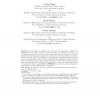38 search results - page 6 / 8 » On the computing power of fuzzy Turing machines |
116
click to vote
ICTAC
2004
Springer
15 years 7 months ago
2004
Springer
Abstract. P systems (known also as membrane systems) are biologically motivated theoretical models of distributed and parallel computing. The two most interesting questions in the ...
103
click to vote
JUCS
2007
15 years 1 months ago
2007
: In this paper we simplify a recent model of computation considered in [Margenstern et al. 2005], namely accepting network of evolutionary processors, by moving the filters from ...
116
Voted
ISAAC
2004
Springer
15 years 7 months ago
2004
Springer
We propose a model of computation where a Turing machine is given random access to an advice string. With random access, an advice string of exponential length becomes meaningful ...
152
click to vote
DNA
2007
Springer
15 years 8 months ago
2007
Springer
In search for “realistic” bio-inspired computing models, we consider asynchronous spiking neural P systems, in the hope to get a class of computing devices with decidable prope...
117
click to vote
SPAA
2005
ACM
15 years 7 months ago
2005
ACM
We study the problem of asymptotically reducing the runtime of serial computations with circuits of polynomial size. We give an algorithmic size-depth tradeoff for parallelizing ...

